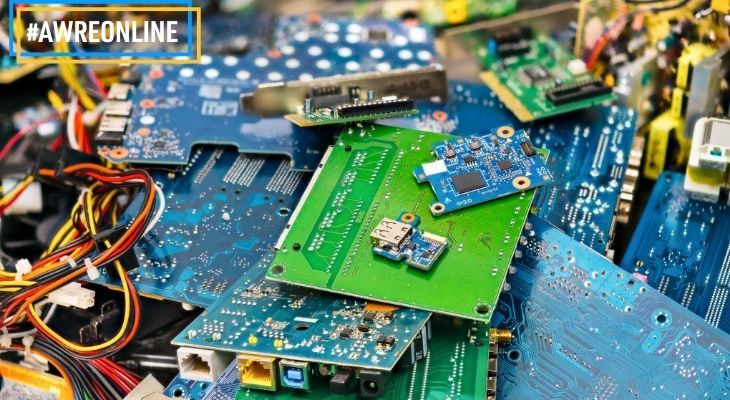5 TAKEAWAYS | E-Waste – Expanding the NTCRS
What will an expanded National Television and Computer Recycling Scheme (NTCRS), to include all electrical and electronic equipment (EEE) look like?
E-waste is a significant risk to the Australian environment, the collection of electronic equipment can prevent dangerous chemicals such as mercury, lead, beryllium, brominated flame retardants, and cadmium from ending up in our soil, water and air. The growing adoption and purchase-rates of technology means there is more e-waste being disposed of than ever before.
The session provided insight into what an expanded NTCRS would look like, and the viability of certain schemes in collecting and recycling electrical and electronic equipment, removing its risk to the environment. The Australian and New Zealand Recycling Platform (ANZRP) manage the TechCollect program, Australia’s leading e-waste collection channel. The organisation have been advocating for a stronger e-waste collection program, expanding its scope to achieve new efficiencies and positive outcomes. ANZRP CEO Warren Overton moderated the educational and insightful discussion.
If you would like a recap of the session check out our 5 takeaways below!
1. The umbrella approach to legislation
It seemed that number one on the agenda, and agreed on by all panelists, was the need for a more cohesive and national approach when it came to branding and marketing the NTCRS, and all schemes. David Kuhn, Regional Strategic Co-ordinator, Resource Recovery of the SSROC, said “there is frustration in the industry at how the Product Stewardship Scheme operates in isolation”. He continued to also suggest a rebrand of the current NTCRS scheme and name, keeping it simpler for consumers to understand.
Pascal Leroy of the WEEE Forum echoed David’s comments and drew from experience in Europe’s approach to their legislation and shemes, noting how countries banded together to create a harmonized European set of standards. “The aim is not too confuse citizens, the message and legislation needs to be communicated across Australia, with the same consistent messaging, reducing confusion” he said.
2. Protecting the environment
“It’s important to note that environmental protection is at the core of creating this legislation around e-waste” said Pascal. Monina de Vera seconded that in the session, as she spoke on the main goal of the legislation centering around minimising the environmental impact of e-waste and WEEE.
Moderator Warren Overton, CEO of ANZRP, highlighted a number of key benefits to an expanded NTCRS scheme to open up the session. In his comments, he noted that through the work of the NTCRS currently, 500,000 tonnes of e-waste had been avoided being disposed into landfill. However, with an expanded scheme, that this could exponentially increase, doing great things for the environment in ways of greenhouse emissions.
3. Creating jobs
The expansion of the NTCRS would mean the creation of many jobs domestically said Warren, namely in the recycling sector. This could also be said for creating more jobs in the repair and collection sectors, as highlighted by Pascal.
With an expanded NTCRS, comes and increase in the recycling and recovery of valuable materials, creating the need for more jobs to implement these processes correctly and efficiently. Pascal noted that although it does happen, consumers shouldn’t be allowed to repair their own products, due to the dangers of mistreatment and harm caused by safety hazards. Expanding the scheme would see more opportunities for consumers to recycle EEE through the scheme with more collection points, and in turn, more workers needed to roll out the recycling of the scheme.
4. The cost-effectiveness of it all
Speaking on the key messages from local Government, David noted the need to be able to share financial costs and regulations of recycling within the expanded scheme. Warren echoed this sentiment, speaking on the importance of scale when it comes the NTCRS. He said reducing costs in the Product Stewardship Scheme, and investing in equipment needed could significantly reduce costs all around, enhancing effectiveness of an expanded NTCRS.
Monina also noted that a major benefit of an expanded scheme would mean the cost of the PRO may be spread across more tonnage, proving a big benefit to producers in the e-waste sector. A challenge that was spoken of was the rates of collection differing majorly due to an expanded scheme, to pertain to the range of products that would be brought in.
5. Convenience is key
She continued to then speak on convenience, another key point agreed on its importance by all panelists. A major challenge that could come with an expanded NTCRS is the need for more containers, to include more waste streams and EEE for collection. “A sophisticated recycling infrastructure is needed to be put in place with an expanded scheme, so all items can be properly recycled and treated, especially those that contain hazardous materials” said Monina.
It was highlighted that councils are an important part of the collection part of the scheme, with David noting that the Sydney council collected 28 tonnes of e-waste at a recent event. “It’s all about creating a level playing field, working to the same rules and achieving the same objectives” said Warren.
“The higher the scope of the legislation, it makes sense to include more collection points” voiced Pascal. The notion of an expanded NTCRS becoming a ‘one-stop shop’ for consumers to recycle their e-waste was a common theme in the session.
Panellists
Warren Overton, Australia New Zealand Recycling Platform (ANZRP)
Pascal Leroy, WEEE Forum
Monina De Vera, HP PPS Asia Pacific
David Kuhn, SSROC
Haven’t registered yet? Simply click here to register free online.
-
Subscribe to NSW's biggest platform for waste, recycling and resource recovery
- Subscribe

